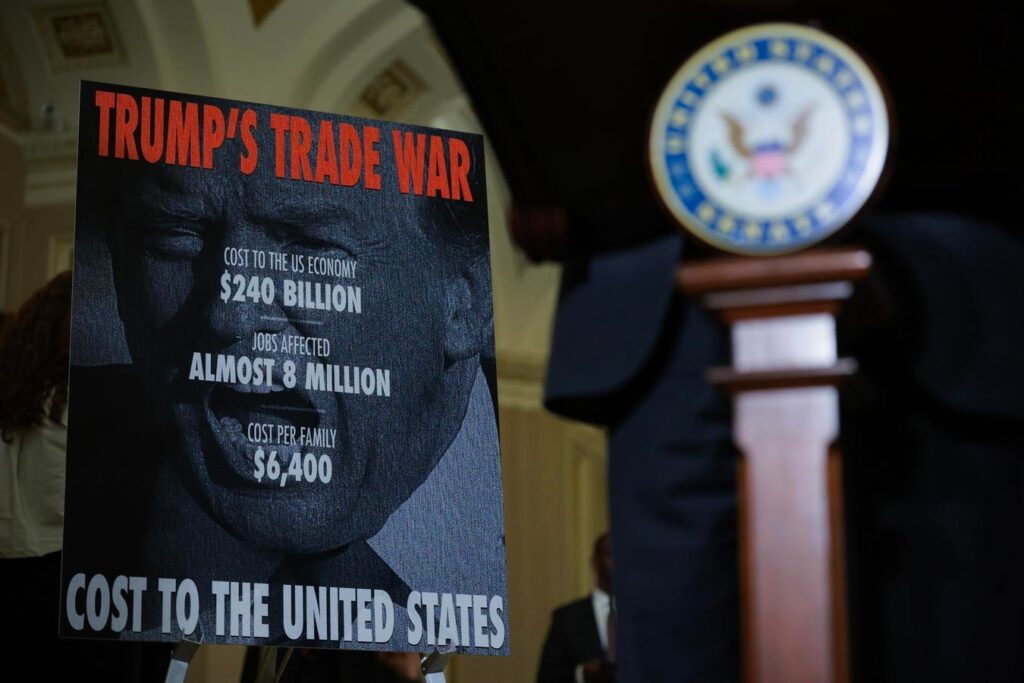Share prices are tumbling around the world in the wake of President Trump’s announcement of higher tariffs on U.S. imports than most countries were expecting, according to The New York Times.
Trump’s tariffs are more than five times more than they were in his first term, when levies on foreign goods affected about 1.8% of U.S. GDP. The tariffs announced Wednesday “appear to affect roughly 10.7% of GDP,” the Tax Foundation Federal Tax Policy Vice President Erica York told The Washington Post.
Except for goods from Canada and Mexico, Trump leveled tariffs of 10% on all U.S. imports and even higher tariffs on other countries. This included a 34% tax on Chinese imports — adding to the 20% tariff he recently put on good from China — as well as a 20% tariff on European Union imports and a 24% levy on Japanese imports, The Times reported.
Trump expressed confidence in America’s future. “We will supercharge our domestic industrial base,” he said Wednesday in a White House ceremony. “We will pry open foreign markets and break down foreign trade barriers. And, ultimately, more production at home will mean stronger competition and lower prices for consumers.”
Investors’ Reaction To Trump Tariffs
Investors around the world sent equity prices down. S&P 500 futures dropped 3.6% and benchmark indices fell “more than 3 percent in Japan, and nearly 2 percent in Hong Kong and South Korea,” according to The Times.
What are economists and market strategists saying? How will Trump’s tariffs affect the global economy? What should investors do?
In a nutshell, they strongly disagree with Trump. Prices for most goods and services may rise and the economy will likely slump as businesses reduce capital spending and slash employees to cut costs while consumers buy only what is essential for their survival and shun the rest.
Investors ought to resist the urge to sell all their stocks but they may benefit from diversifying into asset categories — such as gold or a volatility index — likely to go up as the economy worsens and fear proliferates.
What Economists And Market Strategists Are Saying
Economist and market strategists expressed shock at the magnitude of the tariffs and concern that ongoing uncertainty will reduce growth and slash equity prices.
Expectations-Beating Tariffs
Trump raised the U.S. tariff rate on all imports nearly tenfold from last year to 22% — a rate not seen since 1910, Olu Sonola, Fitch Ratings head of U.S. Economic Research, told The Times. “Many countries will likely end up in a recession,” Sonola added. “You can throw most forecasts out the door.”
The tariffs were shockingly higher than expected and “inexplicable in many ways,” Academy Securities head of macro strategy Peter Tchir told The Times. “I think it’s a disaster.”
The market was expecting 10% tariffs — the announcement of which would have sent stock prices “up quite a bit right now,” Chip Trend Report Chief Technical Strategist Larry Tentarelli told CNBC. “But because the tariffs came in higher than many expected, I think what that does is it creates more downside volatility right now.”
“Trump is going to war with countries on this,” Andrew Brenner, head of international fixed income for the National Alliance Securities, said, according to The Times. “It shows no comprehension as to what he is doing to other countries. And it is going to hurt the U.S.”
Uncertainty Will Keep Investors, Consumers And Business Leaders Paralyzed
As growth slows, uncertainty about the next shoe to drop has “paralyzed” investors, consumers and business leaders, head of U.S. macro strategy for MUFG Securities George Goncalves told CNBC.
Tariffs have flipped from a “one-time event risk” to an “always-present” one, Mandy Xu, Cboe Global Markets head of derivatives market intelligence, told CNBC.
The current expectation in the market is that volatility will persist “given ongoing tariff and growth worries,” she added.
How Trump’s Tariffs Will Affect The Global Economy
The global economy is heading for a combination of slower growth and higher prices that could last many years, experts say.
Uncertainty about the ultimate price increases resulting from tariffs and the extent of retaliation from other countries could slash growth as the manufacturers paying tariffs raise prices for consumers and businesses that delay capital expenditures, JPMorgan Asset Management APAC Chief Market Strategist Tai Hui said, according to CNBC.
The magnitude and timing of the tariffs leaves little room to soften the blow on consumers. “We’re in for several months of a very significant price shock for the American household sector,” Rosenberg Research President David Rosenberg said, according to CNBC.
Tariffs will send stocks into a bear market and cause global stagflation. “Expect retaliation, not negotiation by the EU (targeting U.S. services) and China (focusing on U.S. strategic and business interests),” noted Quantum Strategy Strategist David Roche. “The Rose Garden tariffs will cement the bear market. They will cause global stagflation as well as U.S. and EU recession,” he said, according to CNBC.
Odds of a recession are up significantly. For example, there was a 15% probability of a recession in January and now that risk is 40%, Mark Zandi, Moody’s Analytics chief economist, told the Boston Globe. AMP Head of Investment Strategy and Chief Economist Shane Oliver agrees with Zandi’s 40% recession odds, according to CNBC.
What Investors Should Do
With recession odds rising, investors should expect stock prices to slide. This could mean placing bets on gold — which tends to rise during periods of stagflation and global crisis, noted my April 1 Forbes post.
I also expect the CBOE Volatility Index — the fear gauge which has risen 48% this year, according to Google Finance — to continue to go up as retaliation from other countries comes into focus and Trump responds with even higher tariffs.
Read the full article here


